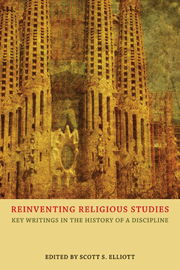Book contents
- Frontmatter
- Contents
- Introduction
- 1 For such a time as this: the Council of Societies for the Study of Religion, 1969–2009
- Part I Inventing and reinventing the field of religious studies
- Part II Method and theory in religious studies
- 9 Neutrality in the study of religion
- 10 Assessing social-scientific theories of religion
- 11 Playing hardball in religious studies
- 12 The academic study of religion: a methodological reflection
- 13 Fending off the social sciences
- Part III Teaching religion
- Part IV Women and the bible in religious studies
- Part V Religion and religious studies in civic life
- Part VI Religious studies and identity politics
- Part VII Islam and 9/11
- Bibliography
- Acknowledgments
- Index
9 - Neutrality in the study of religion
from Part II - Method and theory in religious studies
- Frontmatter
- Contents
- Introduction
- 1 For such a time as this: the Council of Societies for the Study of Religion, 1969–2009
- Part I Inventing and reinventing the field of religious studies
- Part II Method and theory in religious studies
- 9 Neutrality in the study of religion
- 10 Assessing social-scientific theories of religion
- 11 Playing hardball in religious studies
- 12 The academic study of religion: a methodological reflection
- 13 Fending off the social sciences
- Part III Teaching religion
- Part IV Women and the bible in religious studies
- Part V Religion and religious studies in civic life
- Part VI Religious studies and identity politics
- Part VII Islam and 9/11
- Bibliography
- Acknowledgments
- Index
Summary
Some years ago a prominent sociologist of religion, Robert Bellah (1970c), confessed that the scientific study of religion was undermining the faith of his students. Had this been a strictly personal confession, it would not have provoked much notice. Professors, after all, are people with their own religious attitudes and beliefs; and no one expects these attitudes and beliefs to be completely disguised. As long as one is conscientious in avoiding closed-minded views and prejudicial judgments, one can be forgiven for the occasional personal opinions which escape between the lines of one's formal teaching. Yet Bellah was not merely apologizing for himself and for the denigrating attitudes which he personally had expressed. He was apologizing for the academic study of religion in general, and for social-scientific studies in particular. In effect, he claimed that the posture of scientific “objectivity” in the study of religion actually hides a reductive, anti-religious bias toward religious belief.
Bellah's corrective was to downplay the use of abstract concepts in analyzing religious behavior and to encourage his students “to face the religious dimensions of experience directly” (1970c: 4). In so doing he readily admitted that he was blurring the distinction between teaching religion and teaching about religion; but that, to him, was preferable to teaching about religion in such a way as to discourage people from being religious.
- Type
- Chapter
- Information
- Reinventing Religious StudiesKey Writings in the History of a Discipline, pp. 64 - 68Publisher: Acumen PublishingPrint publication year: 2013



